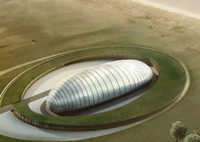
France must spend billions of dollars improving the safety of its huge fleet of nuclear plants following stress tests prompted by the destruction last March of Japan’s Fukushima reactors. However, the tests, which also covered 14 other European Union states as well as Switzerland and Ukraine, cleared for operations the country’s 58 plants.
In clearing the French reactors, France’s National Safety Authority on Jan. 3 called for “an increase in the robustness of the facilities to extreme situations, beyond their existing safety margin … as rapidly as possible.”
Among new requirements, the state power utility Electricité de France (EdF) must propose by July measures to prevent or confine serious accidents and limit large-scale releases in case of such a failure. Further, EdF this year must deploy its proposed national rapid-response force, which is trained to take control of any affected site within 24 hours.
France’s stress tests included the third, 1,650-MW unit of Flamanville on the north coast. Originally planned for completion this year, commercial operations of the Areva EPR reactor are now not due to start till 2016 at a final cost of $7.7 billion, 80% above the initial forecast.
The post-Fukushima stress tests, ordered by the European Commission, aim to assess the ability of the plants to survive natural disasters as well as airplane impacts, terrorist attacks and other threats. The European Commission will complete peer-reviewed reports in June, potentially stimulating new legislation.
In the U.K., investigators found “no fundamental weaknesses” in 33 operating or defunct reactors, according to the Office for Nuclear Regulation (ONR) on Jan. 4. “Work is already under way to improve safety at U.K. sites, such as bolstering flood defenses,” says John Donald, a senior ONR nuclear safety inspector.
U.K. testing also covered the EPR reactor design that EdF plans to use at four U.K. sites, says a company official. The EPR and Westinghouse’s AP1000 generic designs secured last month interim regulatory acceptance.
Full acceptance could take another 12 months, according to Horizon Nuclear Power, a joint venture between Germany’s RWE A.G., Essen, and E.ON S.G., Düsseldorf. Horizon plans to invest about $19 billion in some 6,000 MW of U.K. nuclear power by 2025.



Post a comment to this article
Report Abusive Comment